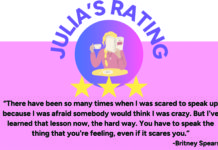13 Reasons Why season three came out on August
The first season centered on the topic of suicide, and all of the messed up things that led a young girl to take her own life. The first season was harmful and toxic, sparking backlash from many credible publications that cited the show’s glorification of suicide and mental illness as a contributing factor to increased suicide rates.
“The copycat effect,” a well-known term among mental health professionals, is a phenomenon that occurs when a large number of people commit suicide as a result of overexposure to graphic or glorified depictions of suicide.
There is clear evidence that 13 Reasons Why sparked that phenomenon, based on a study conducted by the National Center for Biotechnology Information that concluded that suicide rates went up by 29 percent shortly after the release of the first season.
This week, I talked about this with the Director of Diversity Advocacy and Health here at Colorado Mesa University (CMU), Bob Lang. He said that one of the major problems with 13 Reasons Why is that the show fails to portray any elements of hope.
“If they were to change anything it would be the story itself. That part of suicide prevention needs to be the instillation of hope. And if there isn’t a way for individuals to see hope through dealing with the struggles that we all struggle with as human beings, then it becomes just a perpetuation of a way out,” Lang said.
13 Reasons Why is a show that should have stopped a long time ago, but instead, it seems to have spun out of control, twisting through a never-ending cycle of disturbing themes.
Season two, released May 2018, and season three, released just a few weeks ago, are focused on new layers of drama that surrounds the characters from the original story. It is obvious that the show’s only purpose is to cater to drama-loving teens.
This really bothers me. It appears that serious and deadly presentations of sexual assault, school shootings, drug use
Shouldn’t these topics be talked about in a way that is meaningful, thought-provoking and change inducing, rather than being dramatized and marketed to teens as a hot new Netflix series? Season three used these horrible things as plot devices to enhance the dramatic nature of the show. Arguably, there are a few “hopeful” moments. But these are quickly drowned in a murky mire of painful displays.
The bottom line is: 13 Reasons Why is making bank. Most of the actors on the show are making $135,000 per episode. Actor Katherine Langford, who played Hannah Baker, has an estimated annual income of $1 million.
The show has been so successful financially, which could be a large contributing factor in why it continued even after it was proven to be harmful to viewers.
The producers of 13 Reasons Why claim to have changed their way of presenting these topics. They claim to have brought in more psychologists and other experts into the writing process. But regardless, it remains to be a show that capitalizes on awful topics instead of addressing them in a serious manner. It still incorporates little to no elements of hope.
September is suicide prevention month, and CMU takes that very seriously. Grand Junction has some of the highest suicide rates in the country, and officials such as Bob Lang are doing whatever they can to reach out and help.
Symptoms of depression include anxiety, apathy, guilt, hopelessness, loss of interest or pleasure in activities, sadness
If you feel that you are experiencing many of these symptoms, never hesitate to reach out. Visit Bob Lang in Lowell Heiny Hall, visit the Student Wellness Center, or call the National Suicide Prevention Hotline at 1-800-273-8255. Lang wants every CMU student to know that for every person who needs help, there are people who want to give help. You are not alone.






